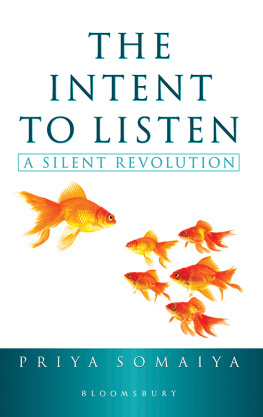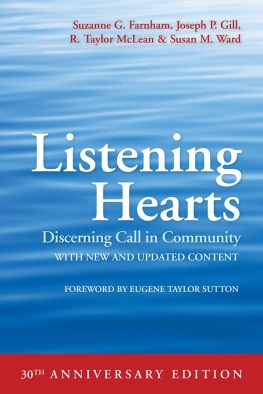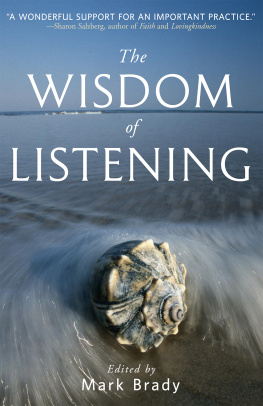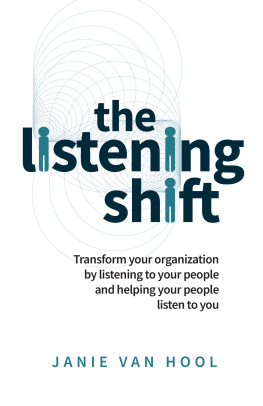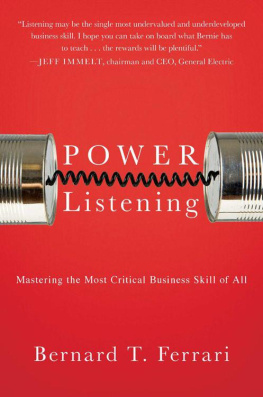Table of Contents

The Intent to Listen
The Intent to Listen
A Silent Revolution
Priya Somaiya

BLOOMSBURY INDIA
Bloomsbury Publishing India Pvt. Ltd
Second Floor, LSC Building No. 4, DDA Complex, Pocket C 6 & 7,
Vasant Kunj New Delhi 110070
BLOOMSBURY, BLOOMSBURY INDIA and the Diana logo are trademarks of Bloomsbury Publishing Plc
First published in India 2019
This edition published 2019
Copyright Priya Somaiya 2019
Priya Somaiya has asserted her right under the Indian Copyright Act to be identified as the Author of this work
All rights reserved. No part of this publication may be reproduced or transmitted in any form or by any means, electronic or mechanical, including photocopying, recording or any information storage or retrieval system, without the prior permission in writing from the publishers
Bloomsbury Publishing Plc does not have any control over, or responsibility for, any third-party websites referred to or in this book. All internet addresses given in this book were correct at the time of going to press. The author and publisher regret any inconvenience caused if addresses have changed or sites have ceased to exist, but can accept no responsibility for any such changes
ISBN: TPB: 978-9-3882-7186-8; eBook: 978-9-3882-7188-2
2 4 6 8 10 9 7 5 3 1
Created by Manipal Digital Systems
Bloomsbury Publishing Plc makes every effort to ensure that the papers used in the manufacture of our books are natural, recyclable products made from wood grown in well-managed forests. Our manufacturing processes conform to the environmental regulations of the country of origin.
To find out more about our authors and books visit www.bloomsbury.com and sign up for our newsletters
Contents
Listening is not given the attention that it deserves. Listening has always been a problem. We hear bothold and youngmen, women, and children relating their negative experiences with listening. My boss doesnt listen; my husband is critical of whatever I do. He doesnt even know about the problems that I face almost on a daily basis with the children, the domestic help, and even with the neighbours. Understand me? How can he? He is not even in the mood to ever listen to what I have to say. The government, does it ever listen? Parties only listen partially during election campaigns, and when elected, their ministers just stop listening. Isnt that the truth? We seem to have become used to this non-listening environment around ourselves.
How about listening to our own selves? We dont really listen to ourselves either. All of us have an observer within us who is aware and, at times, acutely aware, of all that goes on inside our bodies, minds, and hearts. Most of the time, we ignore the messages sent by the observer to our mind, heart, and even our body. How can anyone else listen to us when we dont listen to ourselves? There seems to be another strongly perceptible phenomenon. We listen to those messages, which we want to listen to or are expected to hear. We seldom listen to anything that makes us uncomfortable or anything that we feel should not come to us or are contrary to our expectations. In other words, we exercise our choice, either consciously or unconsciously, about which communication is worth listening to. We decide the worth of things that we listen to and, more often than not, we are defined by our preferences and even by our weak or strong biases.
People keep deleting a lot of information while listening to things. Deleting information per se is not bad at all. In fact, it is required for focussing attention and prioritising actions. It is harmful when relevant and useful information is deleted. When the information and data speak loudly about unpleasant things, it is quickly dropped because we find it uncomfortable. The tendency is to avoid listening to uncomfortable information, not to register or understand it and to delete or remove it, or even to quickly flip through it. So, the question we need to ask ourselves is whether it is wise to develop competencies to manage unpleasant information about ourselves, the situation, or our work? This will help us understand what is going wrong, for others as well as for ourselves; and once we listen to and understand the information, we would be able to discover and address problems and issues as well as the context and the situation in which we function and live. This does not happen automatically. It takes sensitivity, humility, openness to differences, and emotional strength. So for good and effective listening, we have to develop all thisbut how can we do this and ensure that we never lose these qualities?
The first step in learning sensitivity is talking less and listening more. We must become quiet and calm. Some things can help us to talk less:
- Can we say the same thing in fewer words?
- Will body language and non-verbal cues communicate our feelings and thoughts equally well so that there would not be any need to speak?
- We need to find the right time to communicate, when people receiving our communication would be in a better frame of mind to listen. There could be fewer disturbances and the need to repeat messages could also be minimised. Since people would be mentally ready to listen, short and focussed messages would convey more than less.
- Is the person we are speaking with in a mood to listen to us?
- Is this the right place to converse?
- Does the person already know what we want to say? If so, it may not be necessary to speak and waste each others time.
Strengthening our quietness will give us more time to observe and listen. Further, the more we listen the more sensitive we become; and higher sensitivity makes our listening easier, deeper, quicker, and more holistic. So now we can appreciate how beautifully things are connected to each other.
Does quietness only come from not speaking? Sometimes we dont say anything, but the chatter is incessant in our minds. So we have to decrease the volume of the talking mind. Is it about controlling and suppressing this mental chatter? No, the more we control it, the more the mind will chatter. Please remember that anything that is forcibly controlled has a tendency to rebel. A living being does not like anything forced upon it. It requires space and freedom to function well and healthily. Just as a plant will not grow well in a constricted space with fresh air and water alone, because it also requires the company of other plants to thrive. Have you ever given that a thought?
Mental chatter increases with anxiety, fear, and stress. The mind gets into an unending chain of thoughts and questions. For example, anxiety could be experienced in this spiralling form: If the recession continues will my organisation be adversely affected? Will I lose my job? And if I do, will I be able to get another good job? Will the other job give me the same perks and facilities? If not, will I be able to send my son to the same expensive school? If not, what will happen to his high school grades? There are only five years to his twelfth-standard examinations. If he doesnt do well, what about his desire to study International Relations from the Fletcher School, Boston? Will he blame me and say that I failed in my duties as a parent? What will my grandson think of me?
On the other hand, consider this positive thought pattern: The economic recession might not continue. My organisation might do better than it is doing now and if I keep working hard I might receive great appreciation from my employers and also get a promotion. In such a situation, I could have the resources to send my son for his higher studies in Boston and, later, he might become a famous professor and stay back in the USA, with a coveted job in that great institution. I might have a granddaughter instead of a grandson and I could receive a card from her saying that I am the greatest grandparent on this earth!

